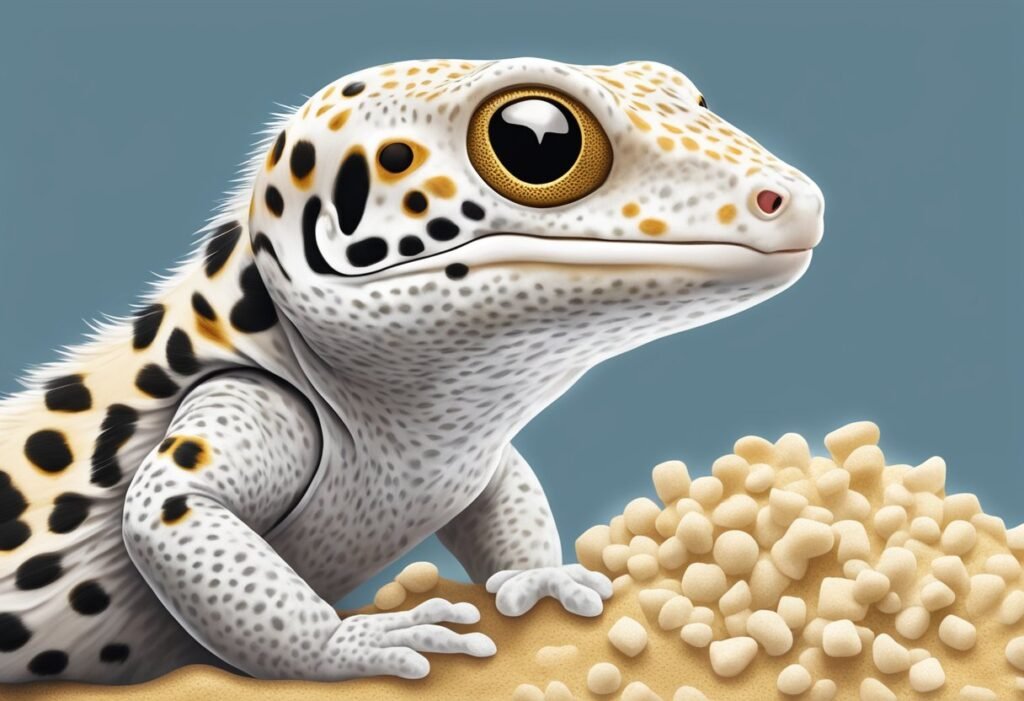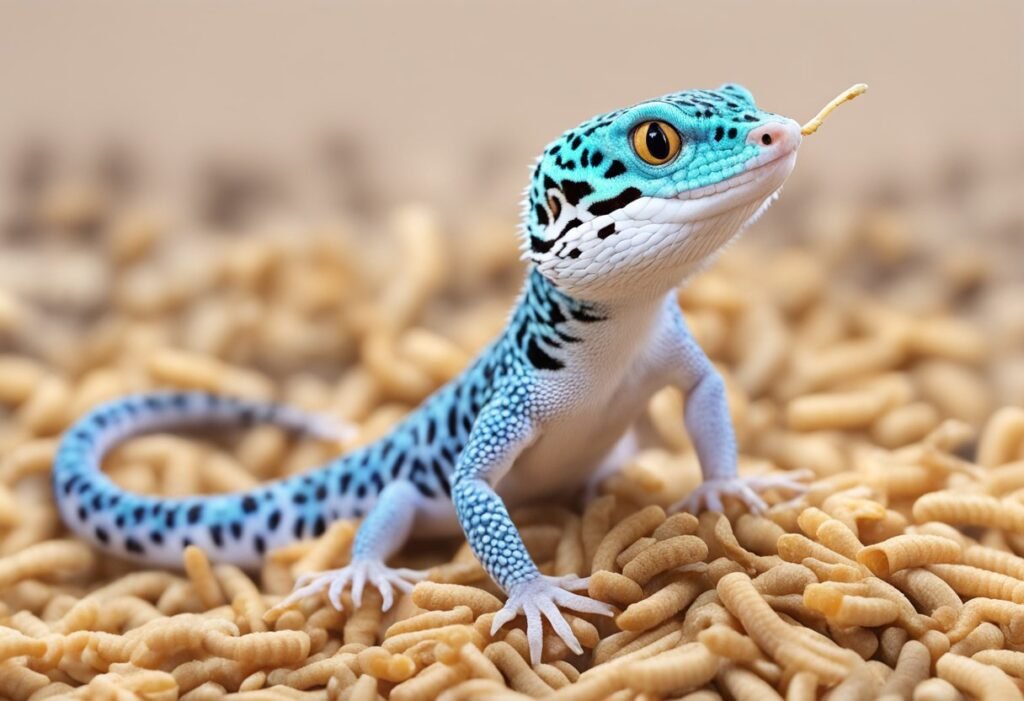Leopard geckos are one of the most popular pet reptiles in the world. They are relatively easy to care for and can live for up to 20 years in captivity. One of the most important aspects of caring for leopard geckos is their diet. These geckos require a well-balanced diet that includes a variety of insects and supplements. Calcium is a crucial component of their diet, but can leopard geckos eat too much calcium?
Calcium is essential for leopard geckos as it helps to maintain their bone health and prevent metabolic bone disease. However, too much calcium can be harmful to their health. Excess calcium can lead to the formation of bladder stones, which can cause discomfort and even blockages in the urinary tract. It can also lead to the formation of calcium deposits in the gecko’s organs, which can be fatal.
It is important for leopard gecko owners to understand the appropriate amount of calcium their pet requires. In this article, we will explore the risks associated with overfeeding calcium to leopard geckos and provide guidance on how to ensure they receive the appropriate amount of calcium in their diet.
Can Leopard Geckos Eat Too Much Calcium

Leopard geckos require calcium for healthy bone growth and development. However, it is possible for them to consume too much calcium, which can lead to health problems.
Excessive calcium intake can cause a condition called hypercalcemia, which is characterized by high levels of calcium in the blood. Symptoms of hypercalcemia in leopard geckos include lethargy, loss of appetite, and constipation.
To prevent hypercalcemia, it is important to provide leopard geckos with a balanced diet that includes appropriate levels of calcium. Feeder insects such as crickets and mealworms can be dusted with calcium powder to ensure that leopard geckos are getting enough of this essential nutrient.
It is also important to avoid over-supplementing with calcium. Leopard geckos should not be given calcium supplements more than once or twice a week, as excessive supplementation can lead to hypercalcemia.
In summary, while calcium is an important nutrient for leopard geckos, it is possible for them to consume too much. Providing a balanced diet and avoiding excessive supplementation can help prevent health problems associated with hypercalcemia.
Importance of Calcium in Leopard Geckos’ Diet

Leopard geckos require calcium in their diet to maintain healthy bones, muscles, and nervous system. Calcium is an essential mineral that plays a crucial role in the proper functioning of the body. Without enough calcium, leopard geckos may develop metabolic bone disease, which can lead to deformities, fractures, and even death.
Calcium is especially important for growing leopard geckos, as they need it to develop strong bones and muscles. Adult leopard geckos also require calcium to maintain their bone density and prevent the development of metabolic bone disease.
Leopard geckos can get calcium from their diet, but they may not always receive enough. Feeding them a diet that is high in calcium is essential to their health. It is recommended that leopard geckos be fed a diet that contains a calcium-to-phosphorus ratio of at least 2:1.
Supplementation with calcium powder is also necessary to ensure that leopard geckos are getting enough calcium. Calcium powder can be dusted onto their food or provided in a separate dish. It is important to note that too much calcium can also be harmful to leopard geckos, so it is crucial to follow the recommended dosage guidelines.
In conclusion, calcium is an essential mineral in a leopard gecko’s diet. Providing a diet that is high in calcium and supplementing with calcium powder can help prevent the development of metabolic bone disease and ensure that leopard geckos stay healthy and happy.
Risks of Excessive Calcium Intake
Leopard geckos require calcium for healthy growth and development. However, excessive calcium intake can lead to several health risks.
Hypervitaminosis D
Hypervitaminosis D, also known as vitamin D toxicity, is a condition caused by an excess of vitamin D in the body. Leopard geckos that consume too much calcium may develop hypervitaminosis D.
Symptoms of hypervitaminosis D in leopard geckos include loss of appetite, lethargy, and weakness. In severe cases, it can lead to kidney failure and death.
Calcium Toxicity
Calcium toxicity is a condition caused by an excessive amount of calcium in the bloodstream. Leopard geckos that consume too much calcium may develop calcium toxicity.
Symptoms of calcium toxicity in leopard geckos include weakness, lethargy, and loss of appetite. In severe cases, it can lead to organ failure and death.
Urinary Tract Issues
Excessive calcium intake can also lead to urinary tract issues in leopard geckos. When the body has too much calcium, it can form crystals in the urinary tract, leading to blockages and other complications.
Symptoms of urinary tract issues in leopard geckos include difficulty urinating, blood in the urine, and lethargy. If left untreated, it can lead to kidney failure and death.
To prevent these health risks, leopard gecko owners should provide a balanced diet that includes the appropriate amount of calcium. It is also important to monitor their calcium intake and seek veterinary care if any symptoms of hypervitaminosis D, calcium toxicity, or urinary tract issues arise.
Recognizing Over-Supplementation Symptoms
Leopard geckos require calcium to maintain healthy bones and bodily functions. However, over-supplementation of calcium can lead to health problems. It is important for leopard gecko owners to recognize the symptoms of over-supplementation to prevent further health complications.
Behavioral Changes
One of the first signs of over-supplementation is a change in behavior. Leopard geckos may become lethargic, lose their appetite, or become more aggressive. They may also show signs of distress, such as pacing or hiding more frequently. These behavioral changes can indicate that the leopard gecko is experiencing discomfort or pain.
Physical Symptoms
Over-supplementation can also lead to physical symptoms. One common symptom is the development of white, chalky deposits on the gecko’s skin or around their mouth. This is a sign that the gecko is not able to process the excess calcium and is excreting it through their skin. Another physical symptom is the development of kidney stones, which can cause pain and discomfort for the gecko.
Leopard gecko owners should monitor their pet’s behavior and physical appearance to ensure they are not experiencing over-supplementation. If any symptoms are noticed, the owner should consult with a veterinarian who specializes in reptiles to determine the appropriate course of action.
Proper Calcium Supplementation
Leopard geckos require calcium for proper bone and muscle development. However, it is possible for them to consume too much calcium. Therefore, it is important to provide proper calcium supplementation to ensure their health and well-being.
Dietary Sources of Calcium
Leopard geckos can obtain calcium from their diet. In the wild, they consume insects such as crickets, mealworms, and waxworms, which are high in calcium. However, it can be difficult to ensure that captive leopard geckos are receiving enough calcium from their diet alone.
Supplements and Dosage
To ensure that leopard geckos are receiving enough calcium, it is recommended to provide calcium supplements. Calcium supplements can be in the form of powder or liquid. When selecting a supplement, it is important to choose one that is specifically formulated for leopard geckos.
The recommended dosage of calcium supplements for leopard geckos varies depending on their age and size. It is important to follow the instructions provided on the supplement packaging or consult with a veterinarian to determine the appropriate dosage.
Feeding Frequency and Amount
Leopard geckos should be fed a balanced diet that includes calcium-rich insects and calcium supplements. However, it is important to avoid overfeeding them with calcium supplements. Overfeeding can lead to health problems such as hypercalcemia.
The frequency and amount of calcium supplements should be determined based on the leopard gecko’s age and size. It is recommended to provide calcium supplements 2-3 times a week for adult leopard geckos and daily for juvenile leopard geckos.
In conclusion, proper calcium supplementation is essential for the health and well-being of leopard geckos. By providing calcium-rich insects and calcium supplements in appropriate amounts, leopard gecko owners can ensure that their pets are receiving the necessary nutrients for proper growth and development.
Monitoring and Adjusting Calcium Intake
Leopard geckos require calcium for proper bone development and overall health. However, too much calcium can be harmful to their bodies. Therefore, it is essential to monitor and adjust their calcium intake accordingly.
One way to monitor calcium intake is by providing a calcium supplement in a separate dish from their food. This allows the gecko to regulate their own intake and prevents overconsumption. It is recommended to use calcium supplements that also contain vitamin D3, as it aids in the absorption of calcium.
Another way to monitor calcium intake is by observing the gecko’s behavior and physical appearance. Signs of calcium deficiency include lethargy, loss of appetite, and weakened bones. Signs of calcium overdose include excessive urination, kidney problems, and even death. If any of these symptoms occur, it is crucial to adjust their calcium intake immediately.
Adjusting calcium intake can be done by reducing the amount of calcium supplement provided or increasing the frequency of feeding. It is also important to ensure that the gecko’s diet includes a variety of calcium-rich foods, such as crickets, mealworms, and calcium-fortified commercial diets.
In conclusion, monitoring and adjusting calcium intake is crucial for the health of leopard geckos. By providing calcium supplements in a separate dish, observing their behavior and physical appearance, and adjusting their diet accordingly, gecko owners can ensure their pets receive the appropriate amount of calcium for optimal health.
Veterinary Intervention for Calcium Overdose
If a leopard gecko has consumed too much calcium, it may require veterinary intervention. The veterinarian may perform a physical examination and conduct blood tests to determine the gecko’s calcium levels. If the calcium levels are too high, the veterinarian may recommend treatment such as fluid therapy or medication to reduce the calcium levels.
Fluid therapy involves providing the gecko with fluids to help flush out excess calcium from the body. The veterinarian may also recommend medications such as calcitonin or bisphosphonates to reduce calcium levels. However, these medications should only be used under the guidance of a veterinarian as they can have potential side effects.
It is important to note that prevention is key in avoiding calcium overdose in leopard geckos. Providing a balanced diet with appropriate levels of calcium and vitamin D3, as well as monitoring calcium supplementation, can help prevent calcium overdose. If a gecko does show signs of calcium overdose, prompt veterinary intervention can help prevent serious health complications.
Frequently Asked Questions
How often should leopard geckos be supplemented with calcium containing D3?
Leopard geckos should be supplemented with calcium containing D3 once a week. It is important to ensure that the calcium supplement is dusted on their food and not left in their enclosure.
What are the signs of calcium overdose in leopard geckos?
Signs of calcium overdose in leopard geckos include lethargy, lack of appetite, constipation, and difficulty in walking. In severe cases, it can lead to kidney failure.
Is it necessary to provide UVB lighting for leopard geckos to metabolize calcium?
UVB lighting is not necessary for leopard geckos to metabolize calcium. However, it is beneficial for their overall health and well-being.
How can you tell if a leopard gecko is deficient in calcium?
Signs of calcium deficiency in leopard geckos include weakness, tremors, and difficulty in walking. In severe cases, it can lead to metabolic bone disease.
Should calcium powder be left in the leopard gecko’s enclosure at all times?
Calcium powder should not be left in the leopard gecko’s enclosure at all times. It should only be provided once a week during feeding time.
Can providing too much calcium with D3 have negative effects on leopard geckos?
Providing too much calcium with D3 can have negative effects on leopard geckos. It can lead to calcium overdose, which can cause kidney failure and other health problems. It is important to follow the recommended dosage and frequency of calcium supplementation.





